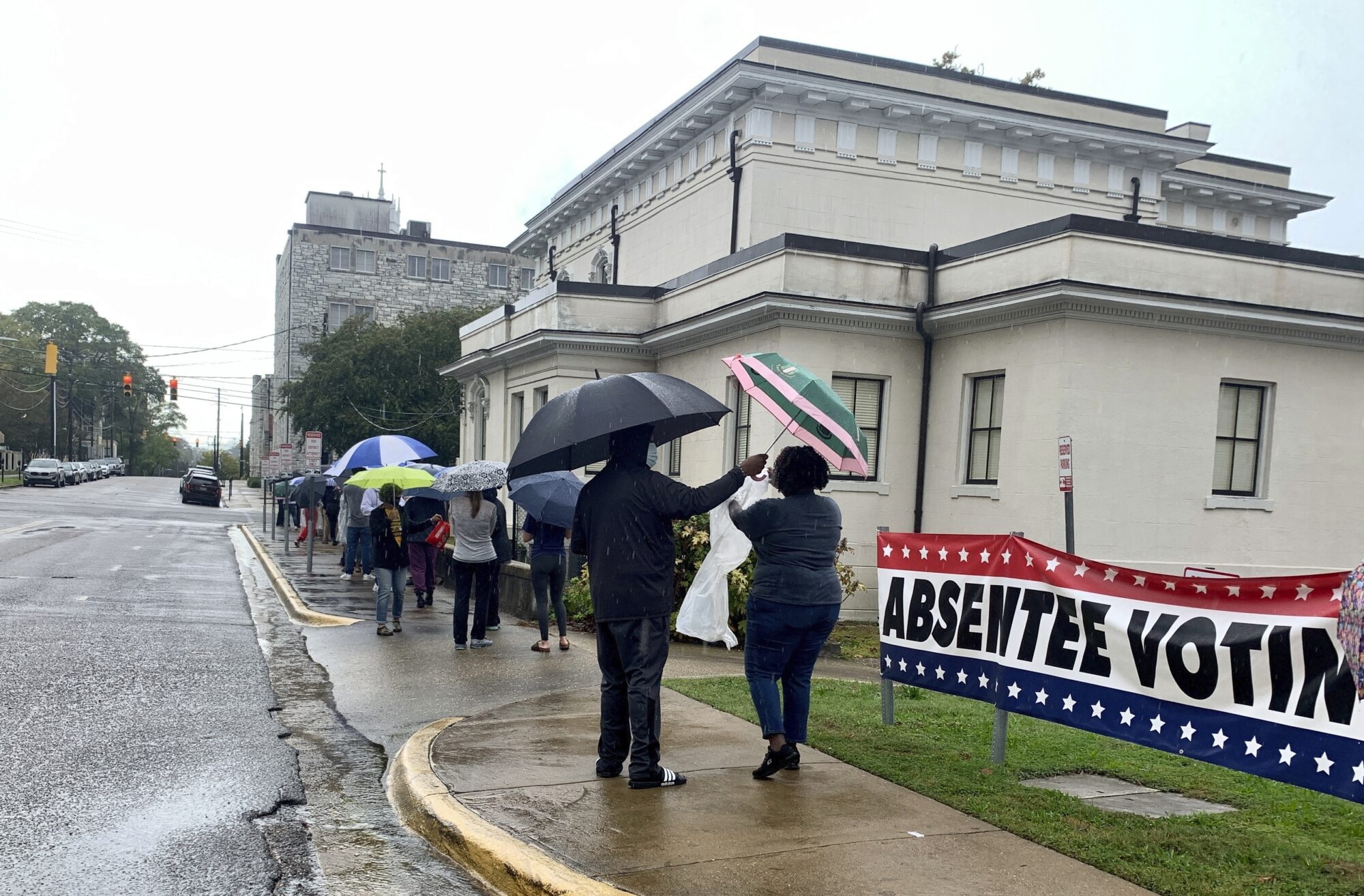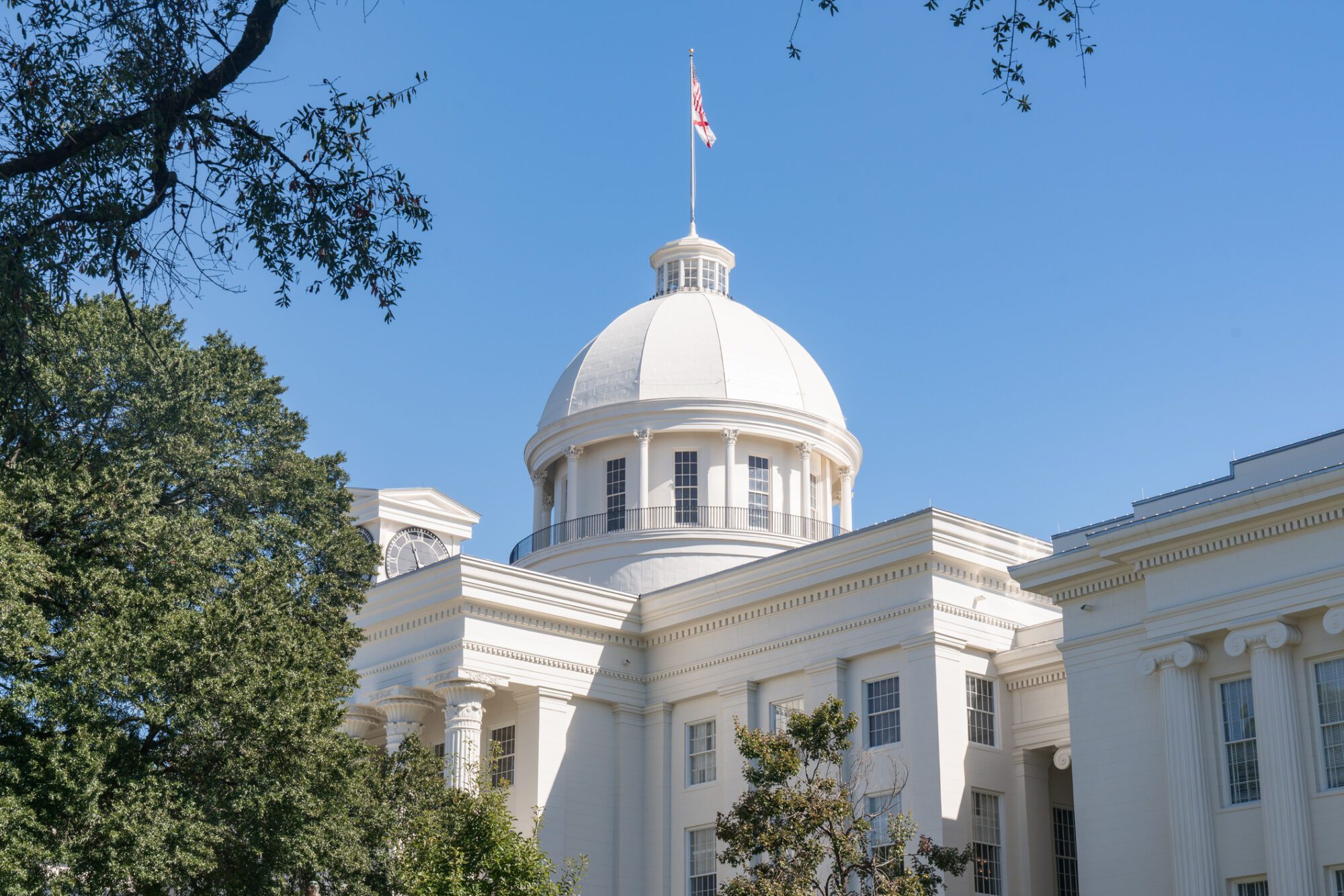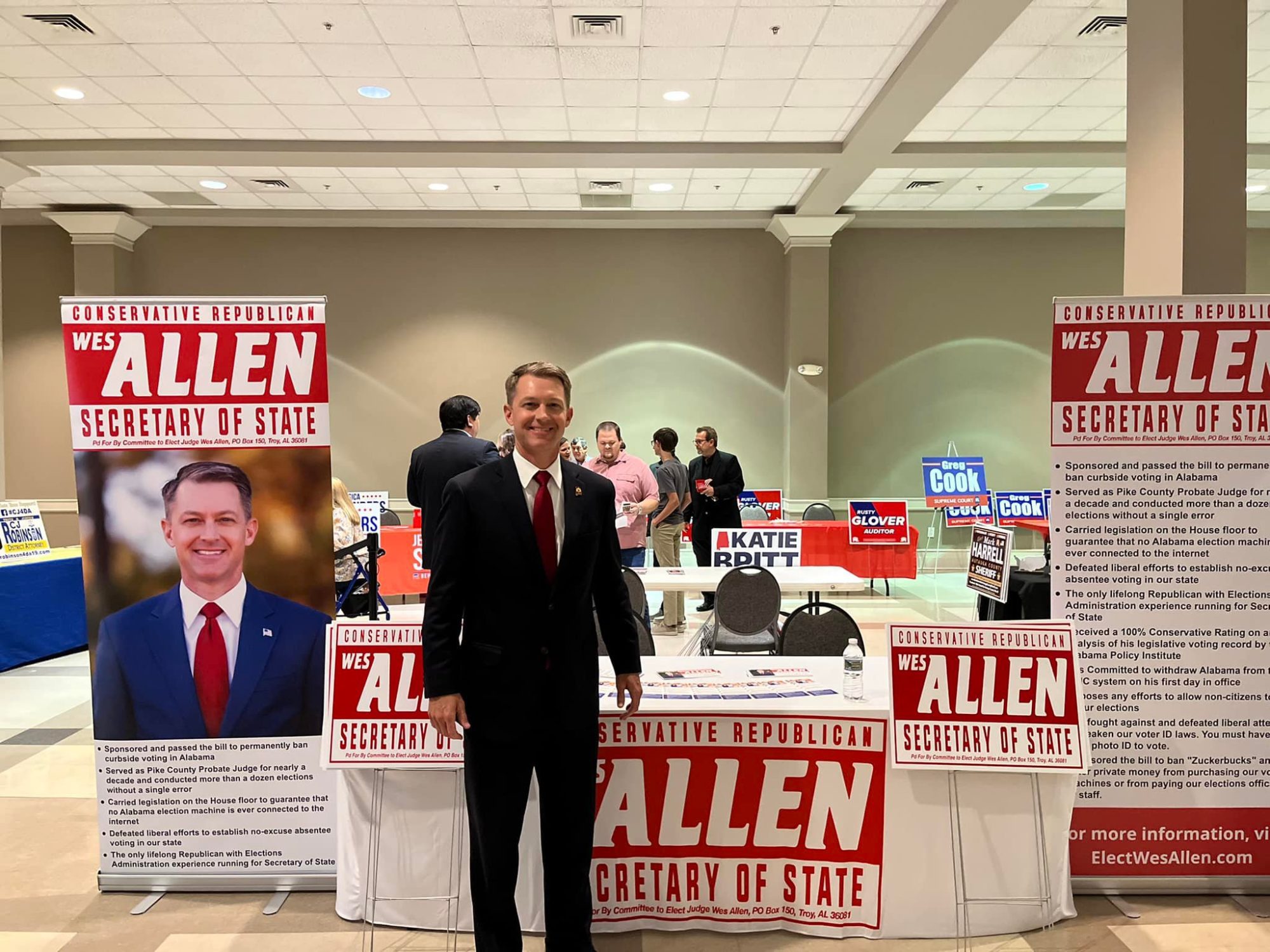Alabama Civil Rights Groups Scramble to Fight Back Against New Voting Law
Republicans this month passed a new law in Alabama criminalizing some absentee ballot assistance. Voting rights groups in the state believe the law is unconstitutional.
Cameron Joseph | March 27, 2024


Alabama’s new voter suppression law has left the state’s civil rights activists preparing for court—and scrambling to figure out what they legally are allowed to do this election cycle.
The new measure passed by Republicans and signed into law by Alabama Republican Governor Kay Ivey last week makes it illegal for paid organizers to help others vote by mail, threatening the work of grassroots and national organizations who help voters register and cast their ballots. It includes a bevy of draconian punishments including lengthy jail sentences if paid organizers help others fill out or return their absentee ballots.
A lawsuit to block the bill is likely in the coming weeks.
“There’s definitely gonna be legal action,” Anneshia Hardy, the executive director of Alabama Values, a progressive advocacy organization, told Bolts. “That was already in discussion.”
A number of other leading civil rights groups who work in the state were tight-lipped about what their legal plans are, but they have been gearing up for this specific fight for some time. Last year, a nearly identical bill passed the Alabama House, but died in the senate. Kathy Jones, the head of Alabama League of Women Voters, told Bolts at the time that if the bill had passed then, “we would have sued.”
The law makes it even harder to vote by mail in one of the states with the most restrictive voting laws in the country, and threatens paid organizers with jail time if they violate its somewhat-vague provisions. Civil rights groups believe the new law is unconstitutional, but they’re even more worried about the fear the law will create for grassroots organizations’ efforts than the enforcement itself.
Hardy said she’d been talking to multiple groups who do voter education and outreach in the state who were alarmed that their normal work helping Black voters vote could now be illegal under the new law. And she said she’d been in touch with allied groups in Florida, which passed a similar law two years ago, about how they navigated that situation.
“Some of the organizations stop the effort [to help people vote], because of the ambiguity and also, quite frankly, not wanting to take that risk. It makes a hostile climate for groups who are just trying to ensure that people have access to voting,” she said.
The new law bans anyone besides immediate family members and cohabitants from turning in anyone else’s completed absentee ballot applications, with the exception for people with disabilities or who can’t read or write, in an attempt to root out voter fraud by targeting what Republicans derisively call “ballot harvesting.”
Anyone who knowingly pays someone else to request, collect, or deliver absentee ballots could face a Class B felony charge—the same felony class as first-degree manslaughter in Alabama—which carries a prison sentence of up to 20 years. Anyone who is paid to request, collect, complete, prefill, obtain or deliver a voter’s absentee ballot faces a class C felony—the same felony class as looting, third-degree robbery and stalking—punishable by up to ten years in prison.
This new law comes amidst a renewed war from Alabama Republicans to restrict voting access in the state and strengthen their vice-like grip on political power at the expense of the state’s sizeable African American population.
Last year, the U.S. Supreme Court ruled that the state’s Republican legislators had violated the Voting Rights Act with an illegal gerrymander of Alabama’s congressional district lines, and ordered them to draw a second district where Black voters would have a say in who represents them. Even that didn’t stop those lawmakers, who proceeded to try to ignore the Supreme Court’s ruling until another court ordered them to reverse course.
Even before this new law passed, Alabama had some of the most onerous voting systems in the country. It’s one of only four states that allows no opportunities for people to vote early in-person, along with Delaware, Mississippi and New Hampshire. It also is one of just 20 states still requiring people to have a specific reason for voting absentee by mail.
And there have been very few proven cases of voter fraud in Alabama. Even the conservative Heritage Foundation, a major proponent of anti-voting fraud legislation, has identified just 20 cases of voting fraud in Alabama since 2000. The only person charged with voting fraud in the last five years is former Republican state Representative David Cole.
“This is a bill that is proposing incarceration and criminal penalties for a problem that doesn’t exist,” ACLU Alabama staff attorney Laurel Hattix said during testimony against the bill last month.
But that hasn’t stopped Alabama Republicans from crying fraud.
When Ivey signed the bill into law last Wednesday, she declared “Under my watch, there will be no funny business in Alabama elections.”
The recently passed law was long a passion project for Alabama Secretary of State Wes Allen, who introduced a similar bill in 2022, when he was still in the state legislature.
Allen, also a Republican, said in a statement after Ivey signed the bill into law that its passage “signals to ballot harvesters that Alabama votes are not for sale.”
But during his tenure as secretary of state, Allen has actually eroded safeguards against voter fraud. His first official act in office was to pull Alabama out of the Electronic Registration Information Center (ERIC), a bipartisan, multi-state information-sharing effort that helps states identify voters who are also registered in other states in order to help prevent voting fraud.
Allen was one of a number of Republican secretaries of state to attack, then quit, the organization after it became a target of false right-wing conspiracy theories. Allen has now attempted to set up a parallel version of ERIC, partnering with a handful of other red states in an effort that experts say lacks the basic information necessary to be accurate and effective.
Ronald James, an Alabama political consultant who until recently was the state organizer for Black Voters Matter, said that the new law will “scare a lot of people” and be “devastating” to grassroots groups like his former organization that work to help Black voters cast absentee ballots—especially rural elderly voters and those with limited literacy.
James said he’d worked with grassroots organizations in recent years whose normal activities are now considered felonies, like giving gas money to volunteers to drive others to vote, “or paying volunteers who are dedicated to making sure that people in senior citizen homes and elderly in their churches and in the neighborhood and community have a chance to cast their ballot.”
Now, if those volunteers violate the new law, they and the organization’s leaders alike could be facing jail time.
“There’s going to be a lot of people—a lot of people who just are not able to vote,” he said. “It’s catastrophic to the political scope of how we are active in communities, particularly in Black communities.”
Sign up and stay up-to-date
Support us
Bolts is a non-profit newsroom that relies on donations, and it takes resources to produce this work. If you appreciate our value, become a monthly donor or make a contribution.




